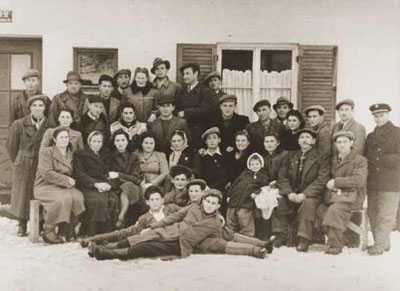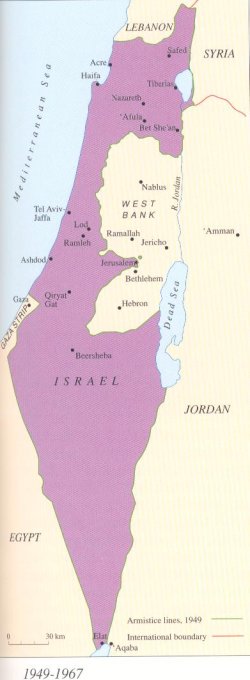Aliyah Bet & Machal Virtual Museum
North American Volunteers In Israel's War of Independence
The Story of Aliyah Bet and Machal
When Israel faced a war of survival, 1,500 American and Canadian men and women, Jewish and Christian, came to her aid. In the words of Yitchak Rabin, “they came to us when we most needed them, during those difficult, uncertain days of our War of Independence in 1948.”
This virtual museum tells the little-known story of the crucial support for Israel by Americans and Canadians during that country’s War of Independence.
Between the end of World War II in 1945 and the beginning of the Israeli-Arab war of 1948-49, Palestinian Jews had two great needs. One was humanitarian, the other was military.

Jewish Displaced Persons Camp, Western Europe, 1947
Their first need was to rescue several hundred thousand Holocaust survivors trapped in displaced persons camps throughout Europe. At the time, there was a British naval blockade preventing all but a handful (the quota was 1,250 Jewish immigrants per month) from coming to the British-controlled Palestine mandate. Ships had to be quietly purchased, then crews had to be found who were willing to man the ships and risk British imprisonment to smuggle the "illegal" immigrants into Palestine. This rescue operation was called Aliyah Bet ("Immigration B," the term used for clandestine immigration). Of 68 Aliyah Bet ships attempting to break the British blockade following World War II, 12 were American. The 12 ships were purchased by American Jews, acting in concert with Palestinian Jewish authorities, and had largely American and Canadian crews, both Jewish and non-Jewish. Some 240 Americans and Canadians were to serve on these 12 ships between 1946 and 1948.
The second need, once Israeli statehood was imminent following the UN Partition Plan resolution of November 1947, was to find persons skilled in the military specialties that Palestinian Jews lacked, since war with the surrounding Arab nations was a virtual certainty. The group answering this call for service in the actual armed forces of Israel was called "Machal," the acronym for the Hebrew words "mitnadvei chutz l'Aretz" ("volunteers from abroad").

Arab nations attack Israel, starting May 15, 1948.
Clandestine recruitment was conducted in five or six major American and Canadian cities. Altogether about 1,000 Americans and Canadians served in all branches of Israel's armed forces, becoming part of the 3,500 overseas volunteers from more than 40 countries. About half of the Americans and Canadians served in the air force – Israel’s greatest need, since only a handful of Palestinians had military flying experience. The remainder were scattered throughout the army, providing experience in naval warfare, artillery, intelligence, tactics, medicine, nursing, armor and numerous other military specialties in which Israelis were lacking. It is generally believed that the American planes and pilots that brought military supplies from Czechoslovakia, and American and Canadian flying crews in the air force provided the critical difference between victory and defeat in the fight for independence in 1948-49.
Among the dead or missing in action when the War of Independence ended in March 1949 were 40 Americans and Canadians. For the survivors, their contribution to the successful war for Jewish independence gave them a unique bond for the rest of their lives with their fellow Jews and the state of Israel.
Perhaps the greatest satisfaction for all those volunteers from abroad was the knowledge that they had been participants in a war of independence for a Jewish nation, an opportunity that no other American or Canadian – and no other Israeli -- could have thereafter.
They had made possible the words of Merka Shevach, one of those Holocaust survivors eventually rescued. When invited to speak at Auschwitz, Poland, at the 60th anniversary of the liberation of that death camp in January 2005, she declared: “I was here naked as a young girl. I was 16. They brought my family here and burned them. They stole my name and gave me a number. Now, I have a country, I have an army, I have a president, I have a flag, and this will never happen again.”
Epilogue:
The Consequences of Violating UN Resolution 181
Everyone always seeks the “first cause” of a brutal war. In the case of the Israeli-Arab conflict, it was undoubtedly the denial of United Nations Resolution 181. Resolution 181, approved by a two-thirds majority of the UN on November 29, 1947, called for the establishment of two states in the Palestine Mandate – a Jewish state and an Arab state.
Despite the overwhelming opinion of the world body, four member states of the United Nations (Egypt, Iraq, Lebanon and Syria), along with the British trained, equipped, and led Transjordan army, invaded Palestine on May 15, 1948. They intended to eliminate the Jewish state, which had announced its name ("Israel") and independence the day before.
In terms of life and the uprooting of human populations, the assault on Resolution 181 had disastrous consequences. Killed in the war from November 29, 1947, to January, 1948, were 4,000 Israeli soldiers and 2,373 civilians, 1% of the population of Israel. By contrast, Israeli military deaths in the 13-month war were three times higher, in proportion to army size, than U.S. military deaths in the four years of World War II. No Israeli family went untouched. The invading Arab armies lost an estimated 5,000 to 15,000 killed.
Some 720,000 Arabs became refugees, although 160,000 other Arabs stayed in the Jewish state and became Israeli citizens. Some 870,000 Jews were citizens of the Arab nations neighboring Israel before the War of Independence. Following the war, 600,000 of these Jews sought refuge in Israel.
Among the 4,000 Israeli military deaths were 119 overseas volunteers, including 40 Americans and Canadians. Those who died and those who survived did not fight for the destruction of the Arabs of Palestine or of any other Arab state, but in the hope and belief that Israel would some day live in peace and friendship with its surrounding Arab neighbors.


 Home
Home